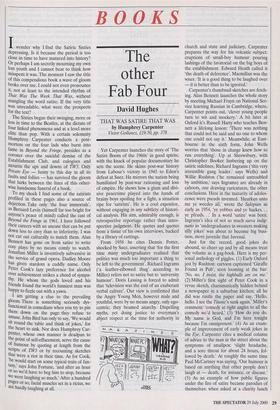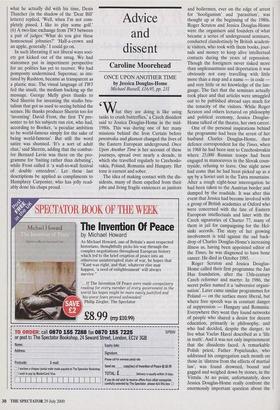BOOKS
The other Fab Four
David Hughes
THAT WAS SATIRE THAT WAS by Humphrey Carpenter Victor Gollancz, £19.50, pp. 378 wonder why I find the Satiric Sixties depressing. Is it because the period is too close in time to have matured into history? Or perhaps I am secretly mourning my own lost youth and I cannot bear to think how misspent it was. The moment I saw the title of this compendious book a wave of gloom broke over me. I could not even pronounce it, not at least to the intended rhythm of That Was The Week That Was, without mangling the word satire. If the very title was unreadable, what were the prospects for the text?
The Sixties began their swinging, more or less in time to the Beatles, at the dictate of four linked phenomena and at a level more elite than pop. With a certain solemnity Humphrey Carpenter conducts a post- mortem on the four lads who burst into fame in Beyond the Fringe, presides as a coroner over the suicidal demise of the Establishment Club, and eulogises and mourns the ups and downs of TW3. Only Private Eye — funny to this day in all its faults and follies — has survived the gloom that lurks between the lines of this other- wise handsome funeral of a book.
To my shock I find some of the satirists profiled in these pages also a source of dejection. Take only 'the four immortals', as Bernard Levin (himself far too bright for anyone's peace of mind) called the cast of Beyond the Fringe in 1961. I have followed their careers with an unease that can be put down less to envy than to inferiority. I was not cut out culturally to match them. Alan Bennett has gone on from satire to write Cosy plays by no means comfy to watch. Jonathan Miller is inventively subversive in the service of grand opera. Dudley Moore has given stardom a cuddly name. Only Peter Cook's lazy preference for alcohol over achievement strikes a chord of sympa- thy. He whom the gods loved and his friends found the world's funniest man was happy to fizzle out with a yawn. I am getting a clue to the prevailing gloom. There is something seriously dys- functional in comedians when you tiy to pin them down on the page: they refuse to amuse. John Bird has only to say, 'We would sit round the table and think of jokes,' for the heart to sink. Nor does Humphrey Car- penter, whose own manner is deadpan to the point of self-effacement, serve the cause of humour by quoting at length from the scripts of TW3 or by recounting sketches that were a riot in their time. As for Cook, he would start on some typical train of fan- tasy,' says John Fortune, 'and after an hour or SO we'd have to beg him to stop, because we were laughing so much.' After a hundred pages or so, facial muscles set in a rictus, we are hardly laughing at all. Yet Carpenter launches the story of 'The Satire Boom of the 1960s' in good spirits; with the knack of popular documentary he sets the scene. He skims post-war history from Labour's victory in 1945 to Eden's defeat at Suez. He mirrors the nation being humiliated by post-war rationing and loss of empire. He shows how a glum and divi- sive peacetime played into the hands of brainy boys spoiling for a fight, a situation ripe for `satirists'. He is a cool expositor, without engaging in any subtlety of histori- cal analysis. His aim, admirably enough, is retrospective reportage rather than intro- spective judgment. He quotes and quotes from a tissue of his own interviews, backed by a library of cuttings.
From 1958 he cites Dennis Potter, shocked by Suez, asserting that 'for the first time many undergraduates realised that politics was much too important a thing to be left to the government'. Richard Ingrams Ca leather-elbowed thug' according to Miller) refers not to satire but to 'university humour'. Doris Lessing is forced to admit that 'television was the end of an exuberant verbal culture'. Our view is confirmed that the Angry Young Men, however male and youthful, were by no means angry, only ego- centric; they beamed anarchy. Dispelling myths, yet doing justice to everyman's abject respect at the time for authority in church and state and judiciary, Carpenter prepares the way for his volcanic subject: eruptions of small-boy humour pouring lashings of the lavatorial on the big boys of the establishment. Edward Heath called it `the death of deference'. Macmillan was the wiser. 'It is a good thing to be laughed over — it is better than to be ignored.'
Carpenter's thumbnail sketches are fetch- ing. Alan Bennett launches the whole story by meeting Michael Frayn on National Ser- vice learning Russian in Cambridge, where, Carpenter points out, 'clever young people turn to wit and mockery.' A bit later at Oxford it's Russell Harty who teaches Ben- nett a lifelong lesson: 'There was nothing that could not be said and no one to whom one could not say it.' Meanwhile, at East- bourne in the sixth form, John Wells worries that 'those in charge knew how to run everything'. Up at Shrewsbury, with Christopher Booker limbering up on the satiric sidelines, Richard Ingrams (`this very irresistible gang leader.' says Wells) and Willie Rushton (`he remained untroubled by ambition,' says Ingrams) are already in cahoots, one drawing caricatures, the other conclusions. Here in the maturity of adoles- cence were pseuds invented. 'Hearken unto me ye weedes all,' wrote the Salopian as early as 1954, 'ye yobbes and ye hacker.. . ye pfeuds. . : In a word 'satire' was born. Ingrams's idea of not so much saeva indig- natio as 'undergraduates in sweaters making silly jokes' was about to become big busi- ness, more juvenile that Juvenal.
Just for the record, good jokes do abound, so cheer up and by all means treat the volume as a gag-book. Here is my per- sonal anthology of giggles. (1) Early Oxford jest by Rushton: cartoon captioned 'Giraffe Found in Pub', seen looming at the bar: `No, no, I insist, the highballs are on me.' (2) Miller's first sight of Peter Cook in a revue sketch, charismatically hidden behind a newspaper in a suburban kitchen; all he did was rustle the paper and say, 'Hello, hello. I see the Titanic's sunk again.' Miller's comment: 'comedy at right angles to all the comedy we'd heard.' (3) 'How do you do. My name is God, and I'm here tonight because I'm omnipresent.' (4) As an exam- ple of improvement of early weak jokes in the Eye, Carpenter cites a medical column of advice to the man in the street about the symptoms of smallpox: 'slight headache, and a sore throat for about 24 hours, fol- lowed by death.' At roughly the same time Paul McCartney was saying, 'Our humour is based on anything that other people don't laugh at — death, for instance, or disease.' (5) As an example of how public figures under the fire of satire became parodies of themselves: when asked at a charity lunch what he actually did with his time, Denis Thatcher (in the shadow of the 'Dear Bill' letters) replied, 'Well, when I'm not com- pletely pissed, I like to play some golf.' (6) A two-line exchange from TW3 between a pair of judges: 'What do you give these homosexual johnnies?"Half-a-crown and an apple, generally.' I could go on.
In such liberating if not liberal ways soci- ety got kicked out of the smug. We had statesmen put in impertinent perspective for us; politics has yet to recover. We had pomposity undermined. Supermac, as imi- tated by Rushton, became as transparent as a plastic mac. The visual language of TW3 fed the insult, the medium backing up the message. George Melly gives thanks to Ned Sherrin for inventing the studio bru- talism that got us used to seeing behind the scenes. He thanks producer Sherrin too for `inventing' David Frost, the first TV pre- senter to let his subjects run riot, who had, according to Booker, 'a peculiar ambition to be world-famous simply for the sake of being world-famous'. But still the word satire was shunned. 'It's a sort of adult chat,' said Sherrin, adding that the combat- ive Bernard Levin was there on the pro- gramme for 'baiting rather than debating', while Frost called it 'a wall-to-wall festival of double entendres'. Let these last descriptions be applied as compliments to Humphrey Carpenter, who has jolly read- ably done his chaps proud.



























































 Previous page
Previous page